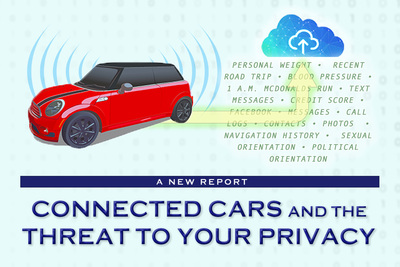Wake Up America "Big Brother Is Riding Shotgun!" A Consumer Watchdog Warning
SEE ALSO: Big Brother Is Watching: Driving Behavior-based Telematics Automobile Insurance Developed
Consumer Watchdog reports that Connected Cars are now and will grow as a threat to your privacy and a clandestine gold mine for car manufacturers
 |
“Consumers should have the right to say no to being tracked in their cars,” said Justin Kloczko, the report’s author, in a statement. “California’s new privacy law offers the best hope for limits on automotive surveillance if the California Privacy Protection Agency fulfills its mandate to give consumers an opt-out right.”
Car sales are historically lagging (TACh believes that this is the real impetus behind the the inordinate coordinated pressure to mandate Electric) for example, Ford is selling less cars than it used to. So the car industry has to find ways to keep making money. That’s where our personal data comes in. To manufacturers, it’s an enormous pot of gold.
Our cars know more about us than we know about ourselves, information such as weight, blood pressure, sexual orientation, race, economic status, down to which doors open and what time you stepped on the brake. They are vacuums that suck up reams and reams of data, much to our ignorance.One of the largest industries in the world is the auto manufacturing industry. By next year, 95 percent of new cars sold will be connected, meaning they will be essentially online computers on wheels.
Cars collect more data than our phones, often because they collect all of your phone’s data on top of everything you do in the car. As a result, car companies have become data miners first and car manufacturers second. Tesla, for example, is a roving mass surveillance operation that collects information on not just you, but everyone you drive past. Teslas have up to nine cameras inside and outside the car.
American's have always rightly feared Big Brother becoming reality. But the irony is we as citizens have become a Big Brother provider, voluntarily recording, collecting and broadcasting everything for the world to see. We are both the ones doing the surveilling, and unwittingly let companies do it to us.
The consequence is car companies basically reserve the right to do whatever they want with your data: to track, market products, and manipulate your insurance rates. A future where targeted ads pop up on your dashboard is not far off .
The report will also highlight how California’s seminal privacy initiative, the California Privacy Rights Act, gives consumers new rights regarding data protection. And it will spotlight the ways car manufacturers have monopolized consumer data and show how they are dangerous for privacy, with a focus on geolocation. What kind of data do car companies collect, and what they do with it?
Being able to shut off geolocation is elemental to consumer privacy. Pursuant to the California Privacy Rights Act, geolocation is considered “sensitive personal information.” It is not necessary for the functioning of any car today. Car companies use and exploit precise geolocation data for future revenue streams, whether selling or sharing the data for profit, or future product development. The law requires that consumers have the opportunity to opt out.
At present our cars know more about us than we know about ourselves, information such as weight, blood pressure, sexual orientation, race, economic status, down to which doors open and what time you stepped on the brake . They are vacuums that suck up reams and reams of data, much to our ignorance.
“Your car can see you have a drug problem before anyone else does because you are in the wrong section of town at 3 a.m. where drug busts are occurring,” said Alastair Mactaggart, founder of Californians For Consumer Privacy, which spurred Proposition 24, the California Privacy Rights Act. “It knows when you’ve been fired.”
"Your driving behavior, the person in the car. We do have that data," said Rick Ruskin of General Motors. "You've created this connection with merchants and brands. They know your data. We're bringing that onto the dashboard of the car." (and making enormous profits from your data).
See the complete Consumer Watchdog report HERE



